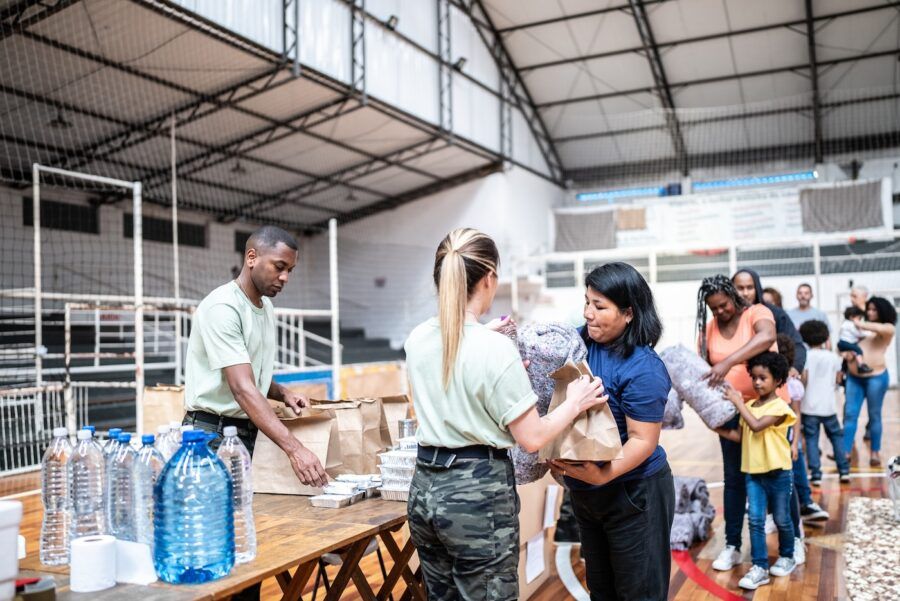Depending on where you live in the United States, you might be at risk for a variety of natural disasters. As climate change's impacts worsen, these natural disasters are more frequent and can pack a far more damaging punch.
The financial effects of a natural disaster can be devastating in a variety of ways. If your car or home are damaged or destroyed, and insurance won't cover some or all of it, you may get saddled with bills or take on new debt. You might be injured and face medical bills, or you could have to miss work to take care of the aftermath.
It's ideal to prepare your finances for emergencies before a natural disaster hits, but it's not always possible. Here are five steps to help you address financial damage following a natural disaster and start your road to recovery.
1. Explore Insurance Coverage
Homeowners insurance covers damage for some types of natural disasters, but not others. It commonly pays claims for damages from smoke, fire, wind, hail, lightning and some types of water damage.
On the other hand, traditional homeowners insurance usually doesn't cover damage from floods, earthquakes, sinkholes or landslides. These types of disasters often require separate, specific insurance policies.
Before you dip into emergency savings, examine your homeowners policy, or any other hazard policies, to find out if any of your damage is covered. Even if you're unsure, it's worth calling your insurer to explore if anything will be covered before you start making out-of-pocket payments.
Additionally, document all damage before you make repairs in case insurance offers any coverage. Find out the required timing, since there may be deadlines for filing a claim after a disaster.
If your car sustained any damage, do the same: Take photos of the damage and contact your insurer for guidance.
2. Apply for Assistance
Federal and state governments often offer assistance programs for disaster survivors, from financial aid to free housing to tangible resources.
The Federal Emergency Management Agency (FEMA) handles relief programs for federally designated disasters. After experiencing a natural disaster, check FEMA's website to see if your area is listed as a federally declared disaster. If it is, you may be eligible to apply for assistance.
FEMA can help families with resources including free temporary housing or funding for housing, and funds for home repairs that aren't covered by insurance. You can apply for FEMA assistance at disasterassistance.gov.
You can also contact your state's emergency management agency, since they may offer additional natural disaster financial assistance and resources, even if the disaster isn't federally declared.
Additionally, explore free resources and available government programs on the Department of Homeland Security's disaster resource website. It lists programs and resources through agencies beyond FEMA, such as low-interest disaster loans, tax relief, disaster unemployment insurance, mortgages for disaster survivors who need to rebuild or buy a new home and free legal services. The American Red Cross also offers free temporary assistance following disasters.
3. Contact Your Creditors
If you experience a natural disaster that impacts your ability to pay bills for credit cards, loans or lines of credit, immediately contact your creditors. Let them know as quickly as possible that you were impacted by a disaster and that it will affect your ability to pay your bills (on time or at all). Ask if they can offer any relief so your account can remain in good standing and you can avoid damaging your credit after a disaster.
While not guaranteed, creditors typically make hardship accommodations for customers who have experienced a crisis. Some creditors proactively offer assistance to impacted customers, while others wait for customers in need to reach out or submit a hardship letter. Depending on the type of creditor, hardship options could look like:
- Loan forbearance
- Lower monthly payments
- Deferred payments
- Waived interest or late fees
- Mortgage foreclosure moratorium
4. Reach Out to Your Utility Providers
If you can no longer live in your home due to a disaster, whether temporarily or permanently, you'll need to let your utility companies know ASAP. Request to pause or completely stop services so you're not paying for utilities you can't use.
If you believe you will only be displaced briefly and don't want to stop utilities, contact your providers and ask if they offer any hardship programs for disaster survivors. Similar to your creditors, they may make accommodations to help you keep your services until you get back on your feet.
5. Monitor Your Credit
Should you struggle to pay your bills on time or at all following a natural disaster, your credit can take a hit. If you've worked out a hardship arrangement with a lender or service provider, though, you'll have more flexibility and it shouldn't impact your credit negatively.
But mistakes happen. It's possible a creditor will say you're permitted to make a late payment or defer a payment without penalty, but it's reported incorrectly as a missed payment and hurts your credit. Following a natural disaster, monitor your credit consistently to ensure everything is reported accurately. You have a right to dispute any errors you see on your credit report.
The Bottom Line
The financial impact of a natural disaster can be massive, not to mention the mental, emotional and physical toll it can take. As you begin to rebuild your life, savings and possibly your home, know there are myriad resources and programs available to help, and creditors and utility providers will often grant hardship relief. Obtaining most forms of assistance does require effort and being proactive, so it's wise to get familiar with the process and what's available before disaster strikes.
Also, be aware that some criminals use disasters to scam victims out of money. Familiarize yourself with common disaster scams and red flags, and remain vigilant so you don't end up with even more stress and damage on your plate.

